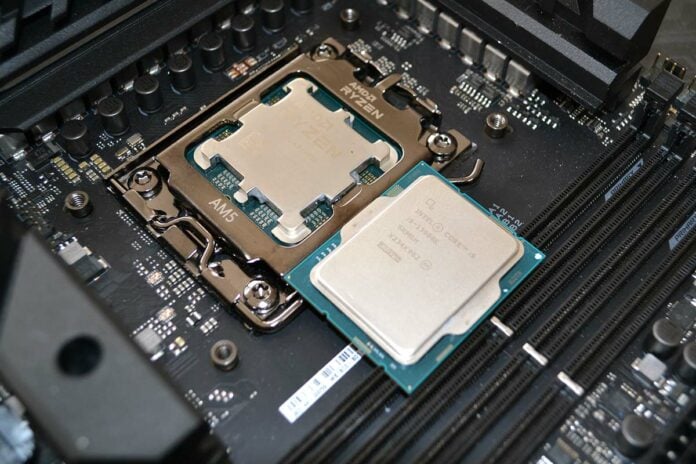Club386’s recent comparison of AMD Ryzen 9 7950X and Core i9-12900K unearthed interesting truths. Both companies’ desire for maximum performance has caused processor power to spiral above 200W, but manually restraining figures to 125W and 65W – two limits used for historical top-of-the-line and energy-efficient chips – does remarkably little to dampen gaming performance yet still produces impressive results in multi-core applications. Aside from the obvious draws of lower running costs and cooler operation, dialling down the juice is a further boon as system noise is more tolerable.
As expected, AMD’s newly minted Ryzen 9 7950X effortlessly sweeps aside Core i9-12900K in multi-core programs. The chasm is vast in Cinebench, for example, where the latest Zen 4 chip at 65W is speedier than Alder Lake’s finest huffing and puffing at 241W. Food for thought.
But now a new Intel contender has emerged. Enter Core i9-13900K. Built on an enhanced Intel 7 process and touting 24 cores and 32 threads wrapped inside a 253W power budget, Raptor Lake’s chief performance protagonist demands attention. We’re already aware of its massive potential compared to myriad chips, but what happens when this beast is reduced to 125W and 65W – can it also provide a humdinger of an experience at lower power ratings? There’s only one way to find out.
A Question of Power
But first it’s useful to understand exactly what we’re seeking to compare. Intel 13th Gen Core uses a monolithic die which integrates cores, cache, GPU, memory controller, and PCIe connectivity. In other words, total chip power lights up these eclectic features as and when necessary. On the other hand, AMD takes a different tack. High-end Ryzen 7000 Series packages comprise three chips – two eight-core CPU blocks and a central IOD home to integrated graphics, PCIe connectivity, DDR5 memory controllers, and USB.
This distinction between how Intel and AMD builds chips is important from a power point of view. AMD cites a 170W CPU budget for Ryzen 9 7950X compared to 253W for Intel Core i9-13900K. Seems like Intel uses a lot more juice, right? It’s not as simple as that; the correct full AMD package power, analogous to Intel TDP, is what the Ryzen team terms Package Power Tracking (PPT) that takes the IOD’s consumption into account, as well.
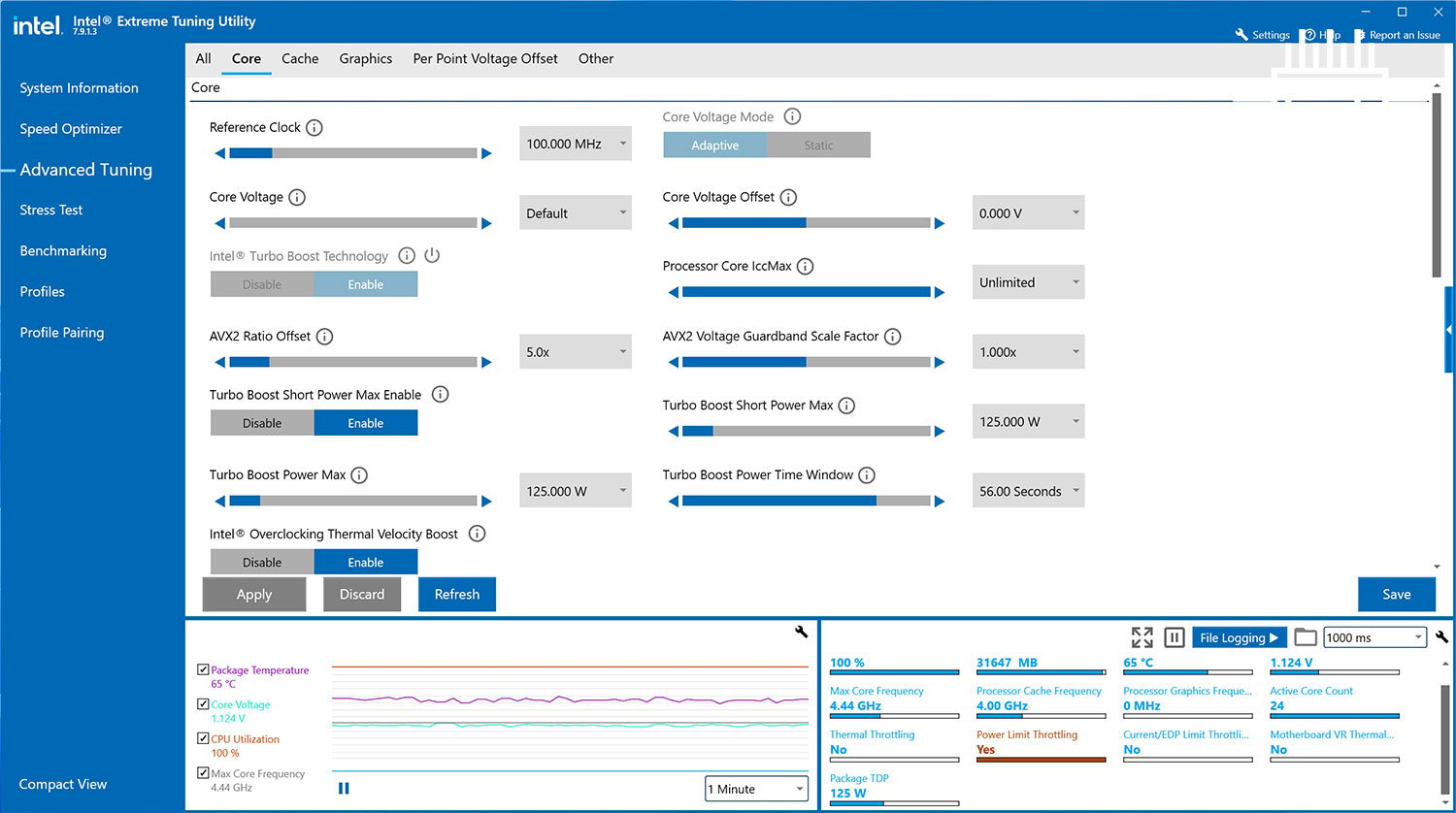
The Core i9-13900K is easily capped at 125W, and this limit applies to the entire processor… controllers and all. Making the wattage comparison fair, therefore, we need to cap Ryzen 9 7950X at a 125W PPT, not merely CPU power.
Et, voila! The same methodology is undertaken when reducing total chip power down to 65W. As you will see later on, total system-wide consumption at 65W, 125W and 230/253W is eerily similar, reinforcing the correct use of PPT for AMD-based processors.
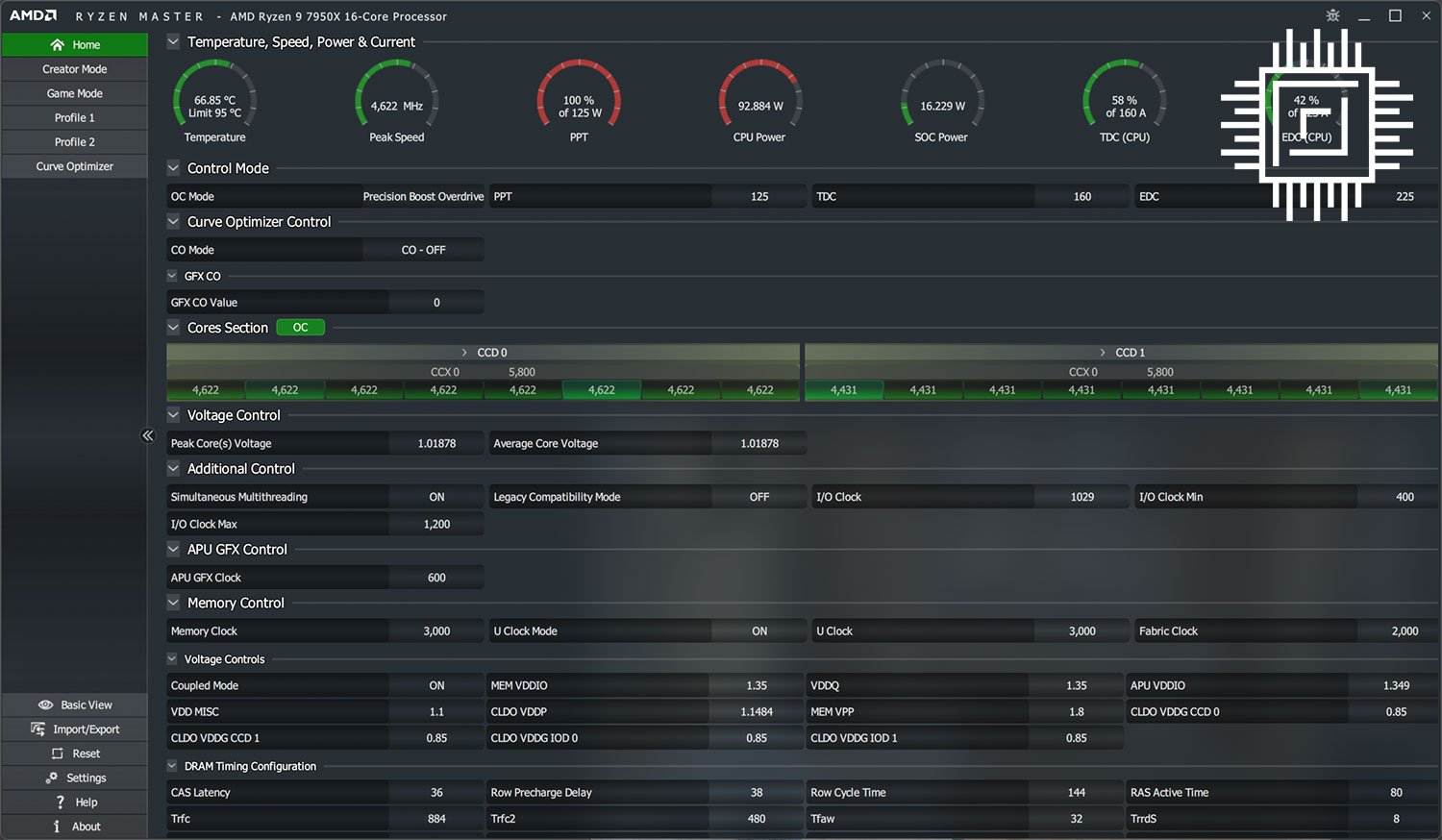
Common components include 32GB (2x16GB) G.Skill Trident Z5 Neo EXPO memory operating at DDR5-6000 CL30, single-fan Noctua NH-D15 chromax.black cooling, Seagate FireCuda 530 2TB NVMe SSD, Nvidia GeForce RTX 3080 FE graphics, and Asus ROG Hero boards from the Z790 (Intel) and X670E (AMD) families. A pre-production be quiet! Dark Power 13 1,000W PSU provided perfectly stable power. We couldn’t make the two platforms more similar if we tried.
| AMD Ryzen 9 7950X | Intel Core i9-13900K | |
| All-core frequency at stock | 5,060MHz | 5,250MHz |
| All-core frequency at 125W | 4,535MHz | 4,430MHz |
| All-core frequency at 65W | 3,212MHz | 2,930MHz |
Understanding upcoming graphs requires knowledge of how each chip behaves when starved of ideal power. Evaluated during a 10-minute run of Cinebench R23, both range-topping processors operate performance cores above 5GHz in out-the-box mode. Intel’s P-cores climb higher, going by our findings, as AMD’s symmetrical design is harder to push to loftier frequencies.
Massaging power down to 125W – be that Intel TDP or AMD PPT – balances the books, so to speak. AMD’s leading-edge, TSMC-built 5nm process shows intrinsic worth by scaling frequency a little higher, which bodes well for performance in a power-constrained environment. Last but not least, capping at 65W encourages the 5nm process shine; it keeps to higher frequencies than rival 10nm ESF.
One would therefore expect that if Ryzen 9 7950X matches Core i9-13900K at stock settings, it will pull ahead at 125W and, especially, 65W through keeping more available frequency for cores and threads. But don’t take our word for it, let’s check out the benchmarks.
CPU Performance
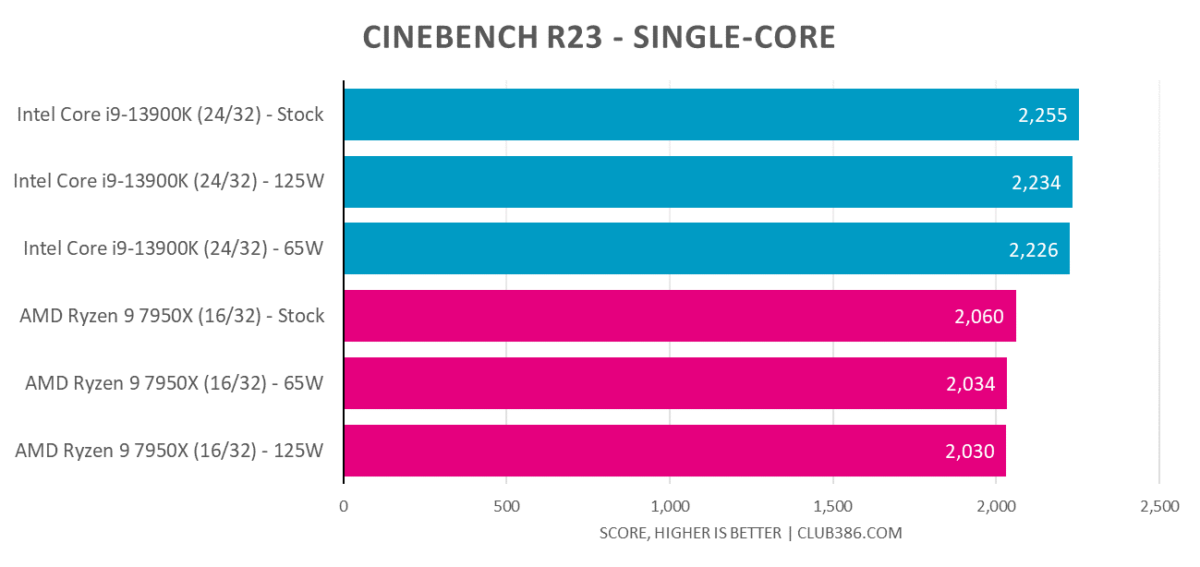
Low loads typically are agnostic of capped power. That’s in evidence as both sets of results are similar irrespective of wattage. Core i9-13900K’s desire to steam ahead to 5.8GHz pays dividends.
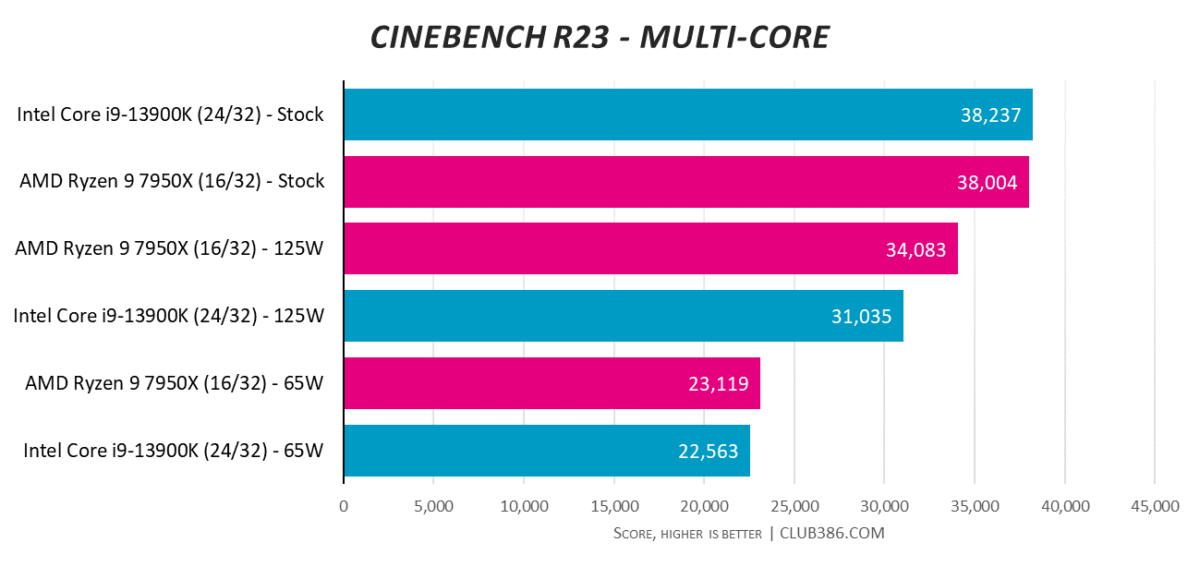
Multi-core is where forcing power bands matters most. The first takeaway is the near-identical performance in out-the-box state. The second, as we posited, is Ryzen being able to keep more comparative frequency at 125W – remember it drops by only 10 per cent; Intel shaves off 16 per cent in the same power scenario – so the score is naturally higher. We’re pretty much at a stalemate at 65W.
Putting these results into wider context, a 250W Core i9-11900K from two generations back returns a score of 14,949. Today’s best CPUs totally blast past that at merely 65W.
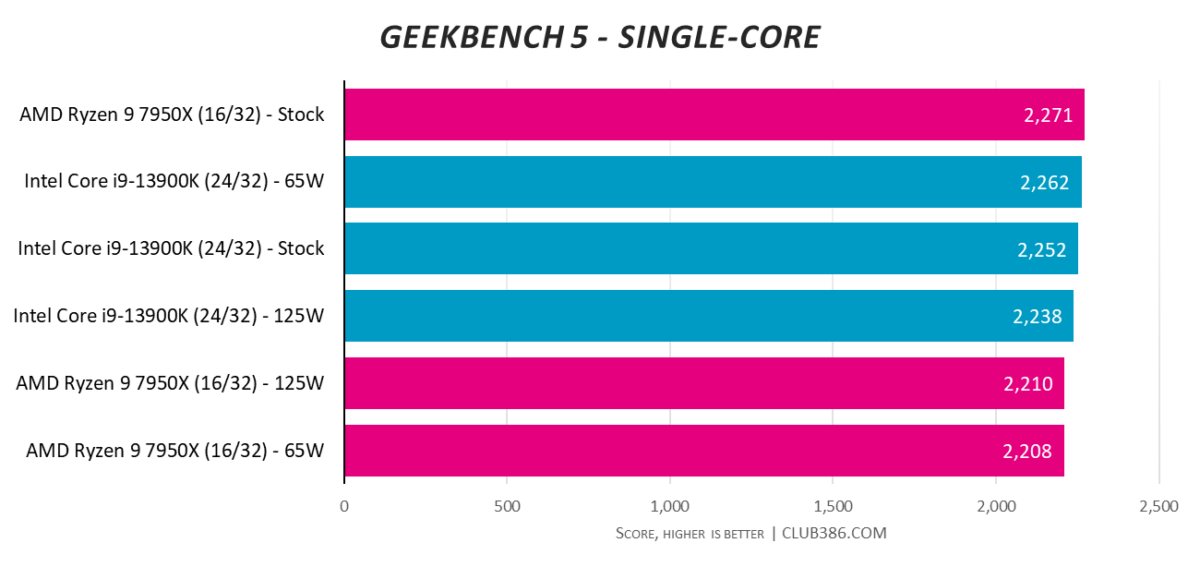
Just look at how close it is in single-core Geekbench. Power doesn’t skew results much.
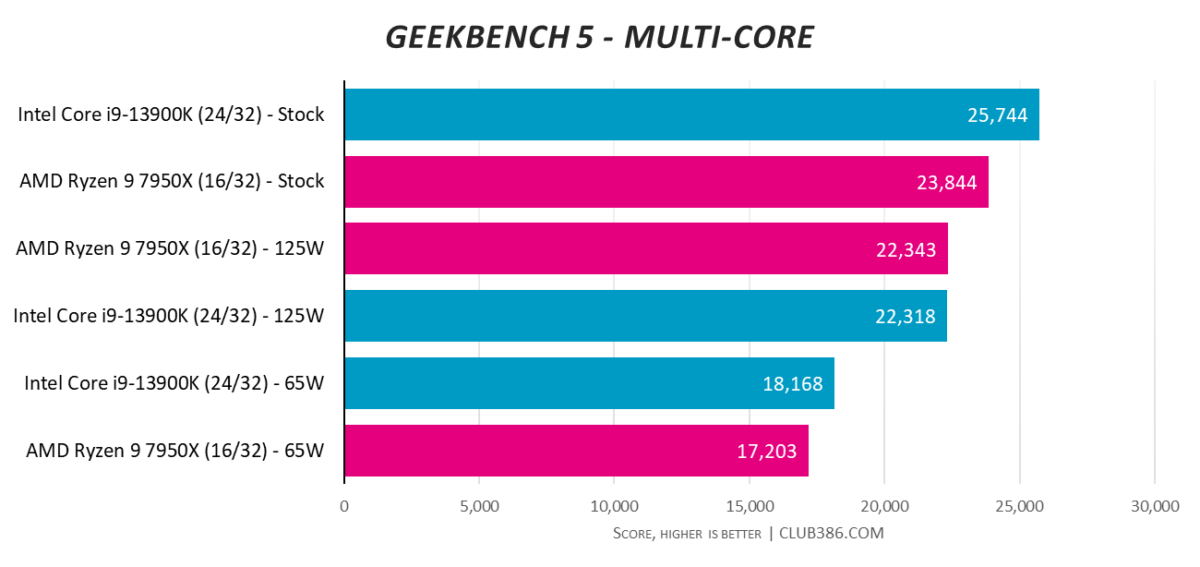
Horses for courses and benchmarks for chips. Intel has two wins here – stock and 65W – yet neither processor is bad.
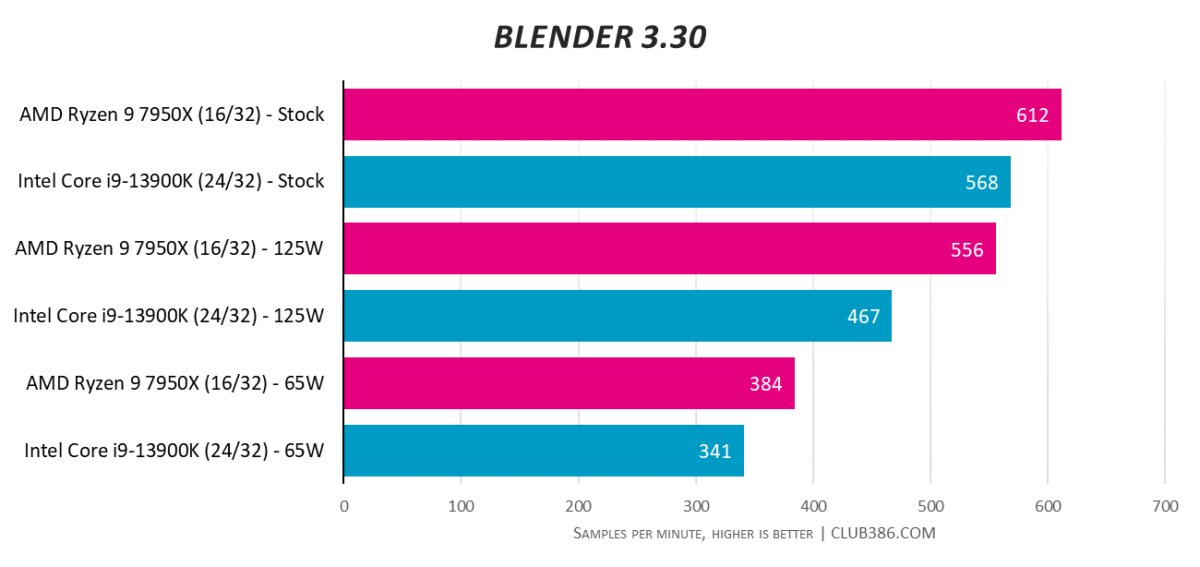
These scores amalgamate performance across three scenes and are presented in samples per minute. An easy win for Ryzen 9 7950X here. It is faster in all three scenarios, peaking at almost 20 per cent speedier at 125W. In fact, it’s almost as quick at this setting as Core i9-13900K is at full-blown 253W.
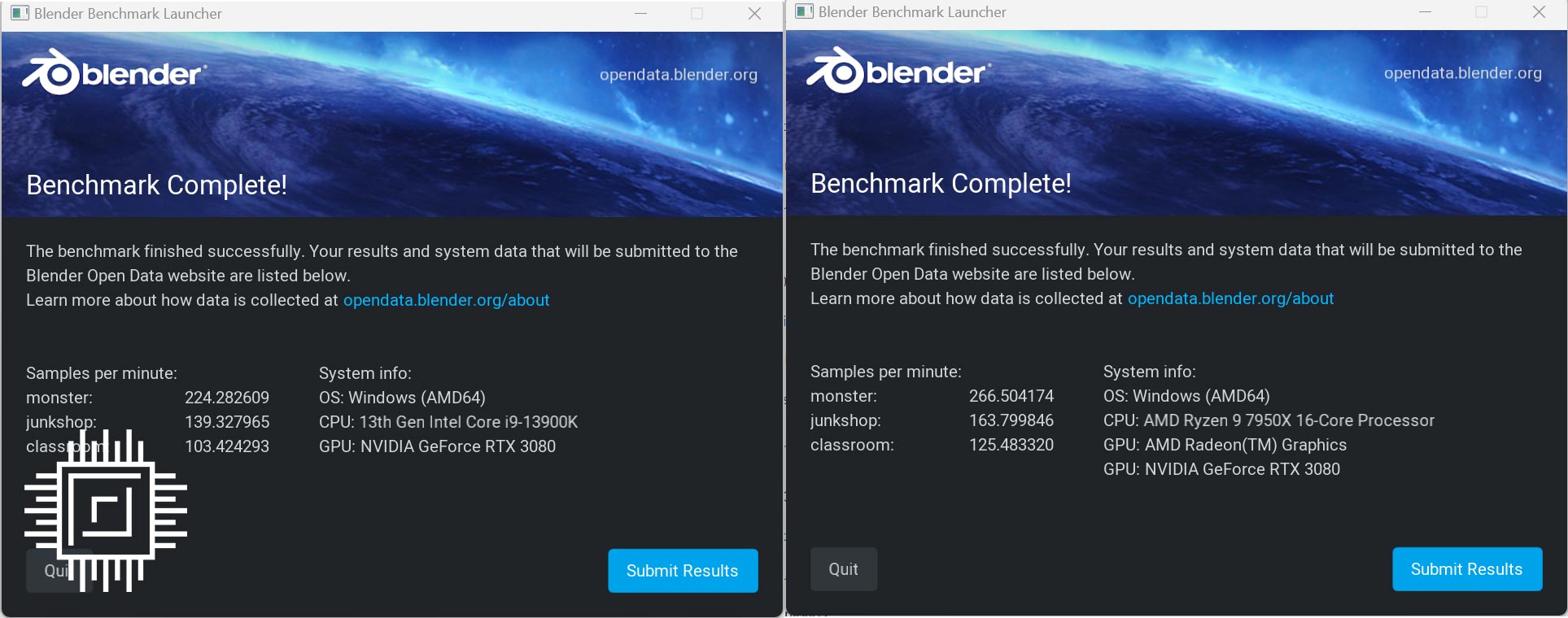
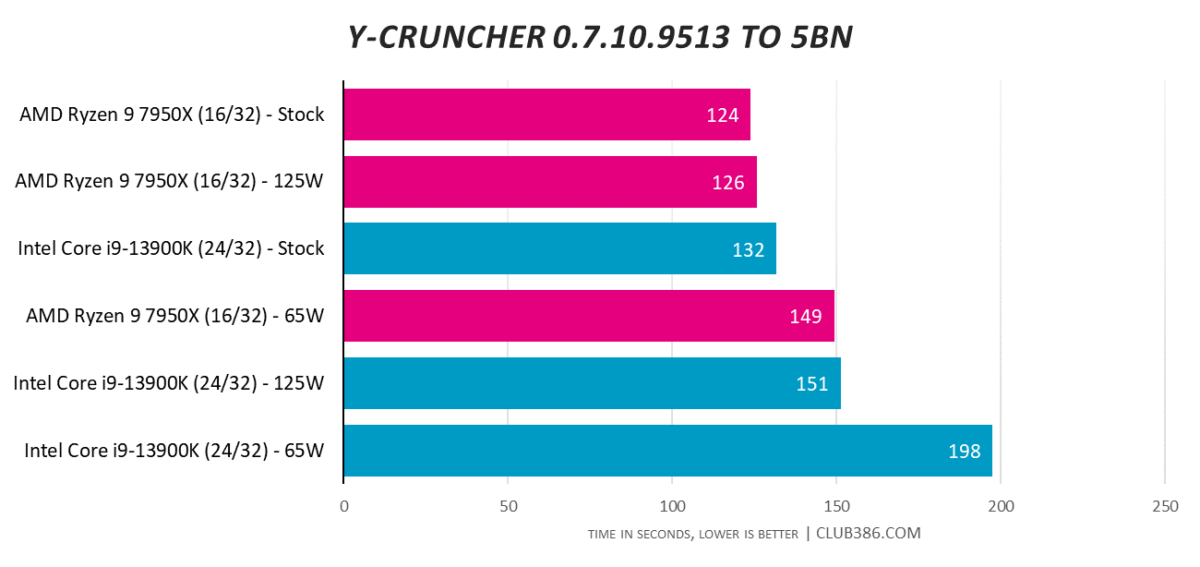
Got nothing better to do than calculate Pi? The tested version of y-cruncher has AVX512 support, and perhaps this is why the Ryzen 7000 Series chief is so damn fast.
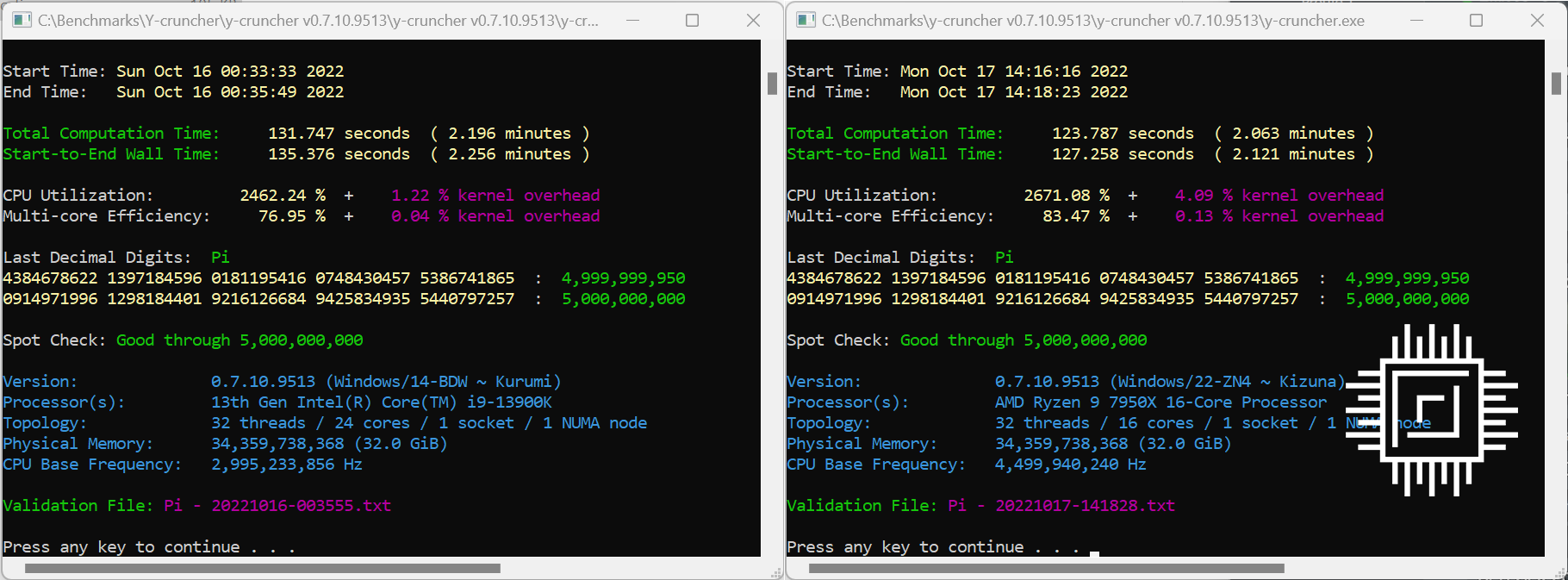
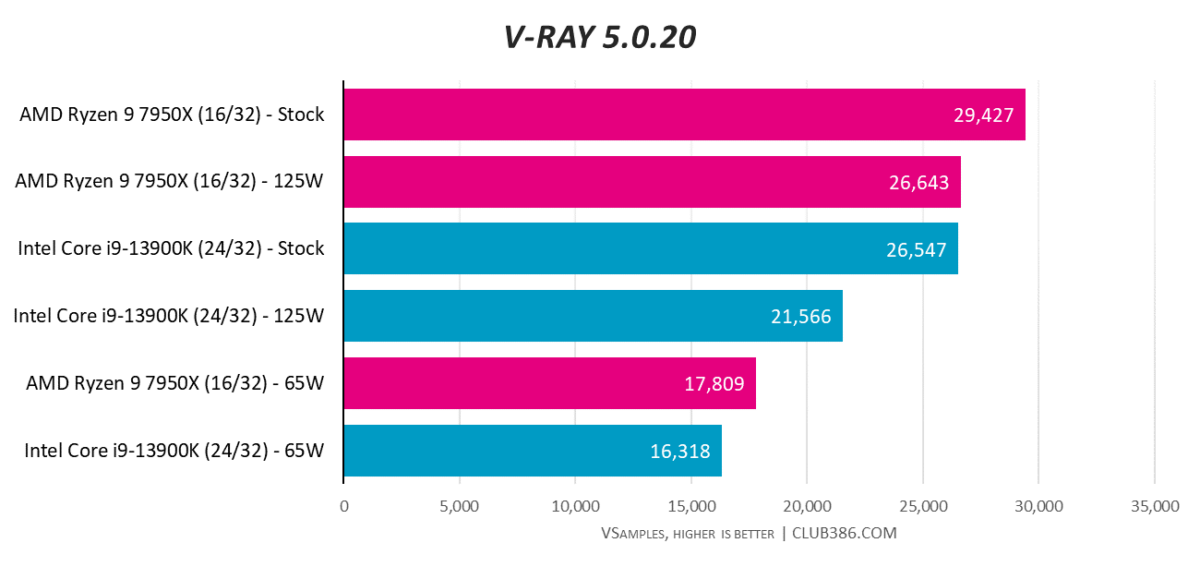
Though it may appear Intel Core i9-13900K is a good multi-core matchup to Ryzen 9 7950X, further benchmarking begins to tip the scales in favour of the ‘Symmetrical Slayer.’
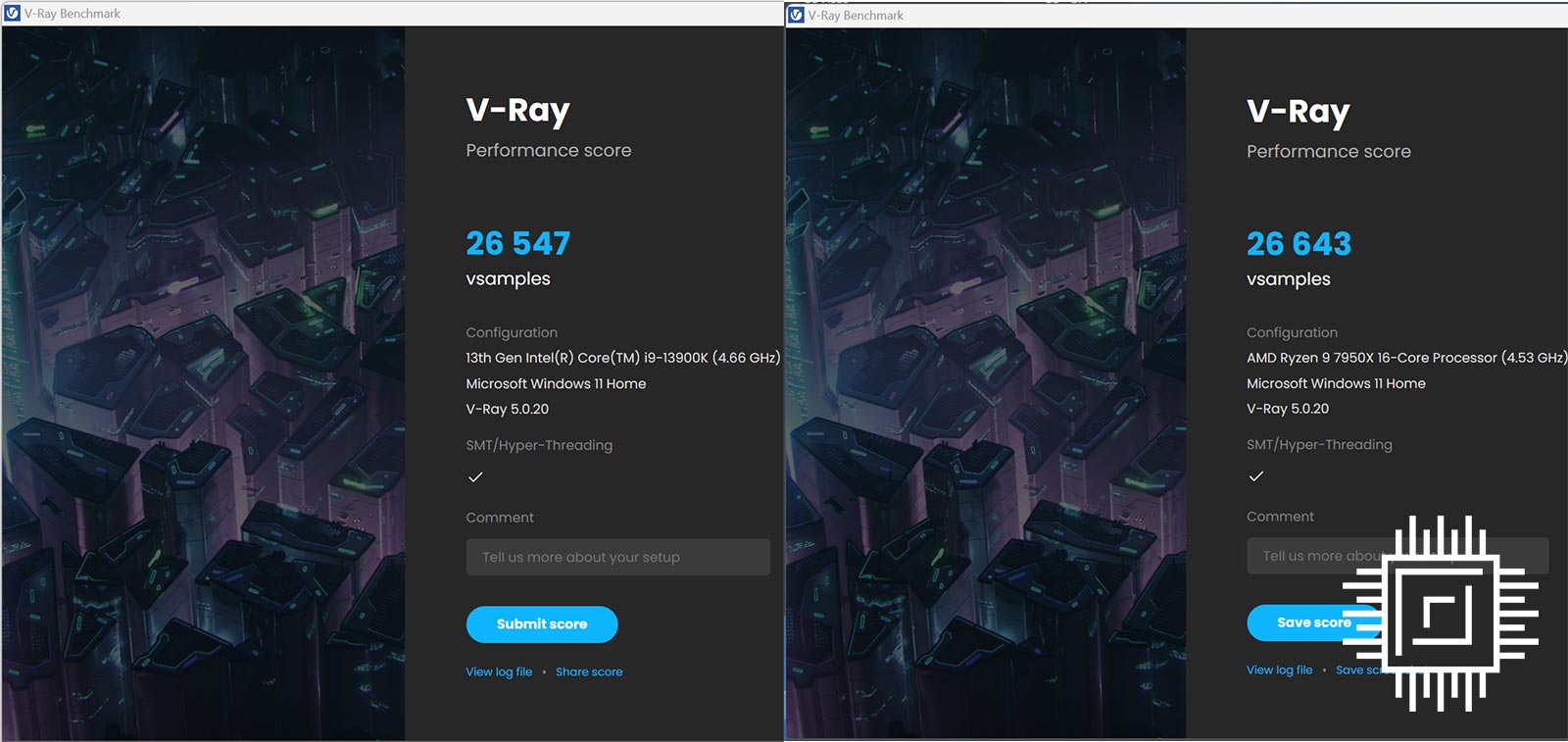
Ryzen is especially good at keeping most of its stock performance when at 125W, suggesting a better voltage/frequency curve than 13th Gen Core.
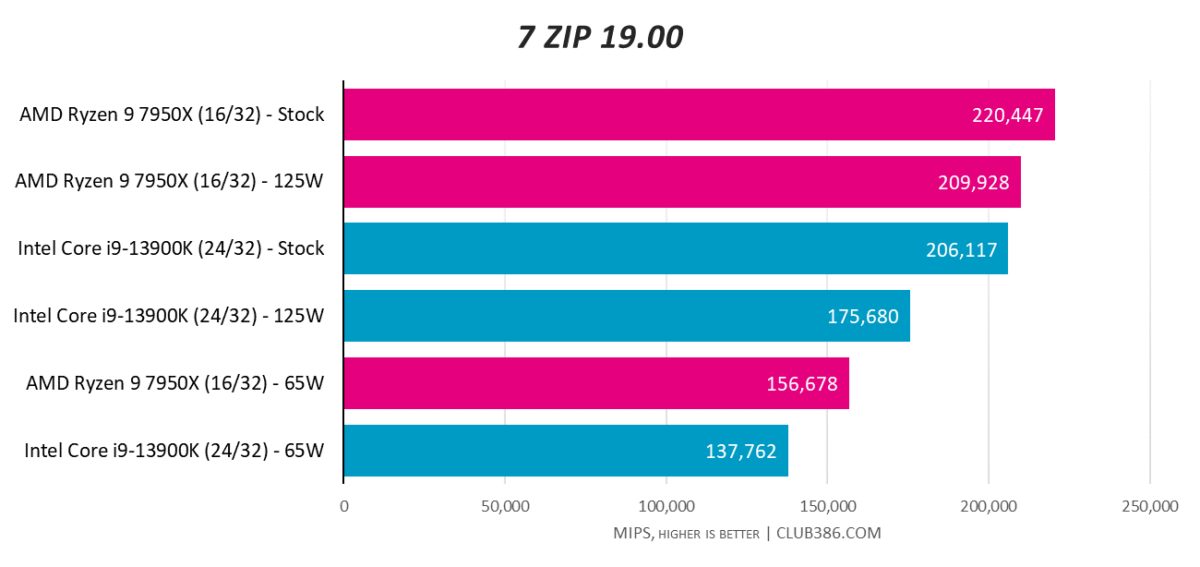
Depending upon workload, Ryzen 9 7950X at 125W is a good proxy for Core i9-13900K in rampage 253W mode.
System and Memory
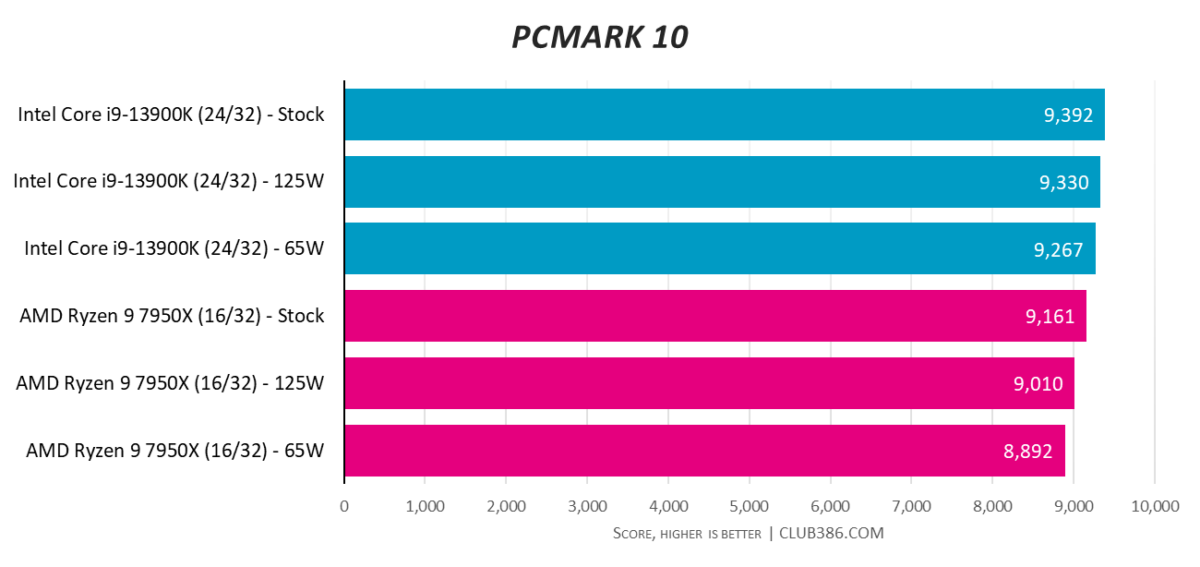
Tables turned once again. Intel at 65W is better than AMD at 230W or so. Not that the bottom 8,892-mark score is bad, mind you.
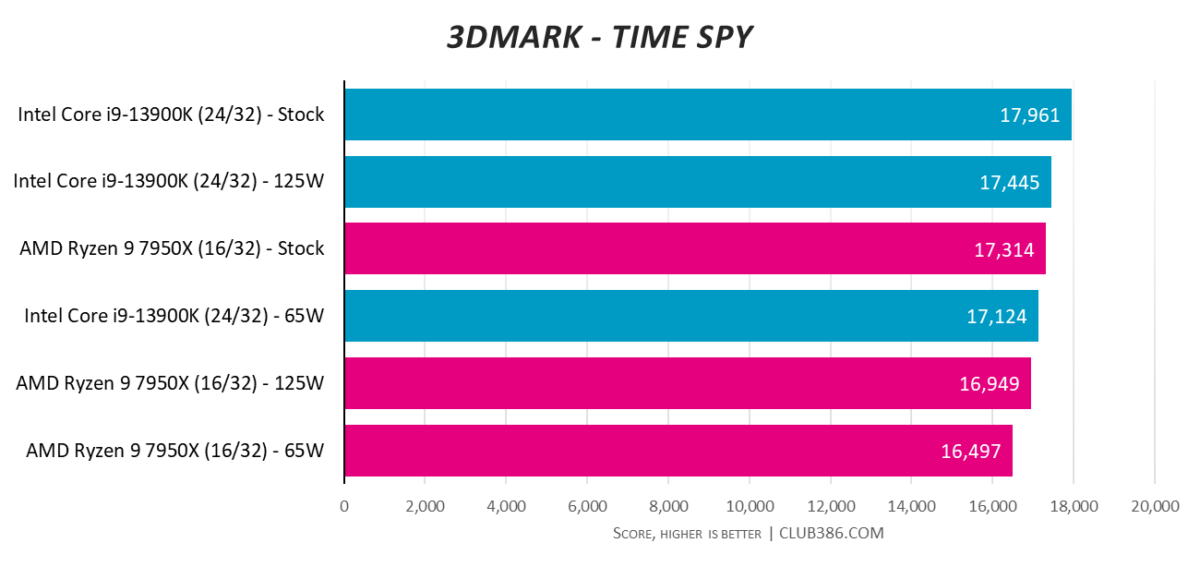
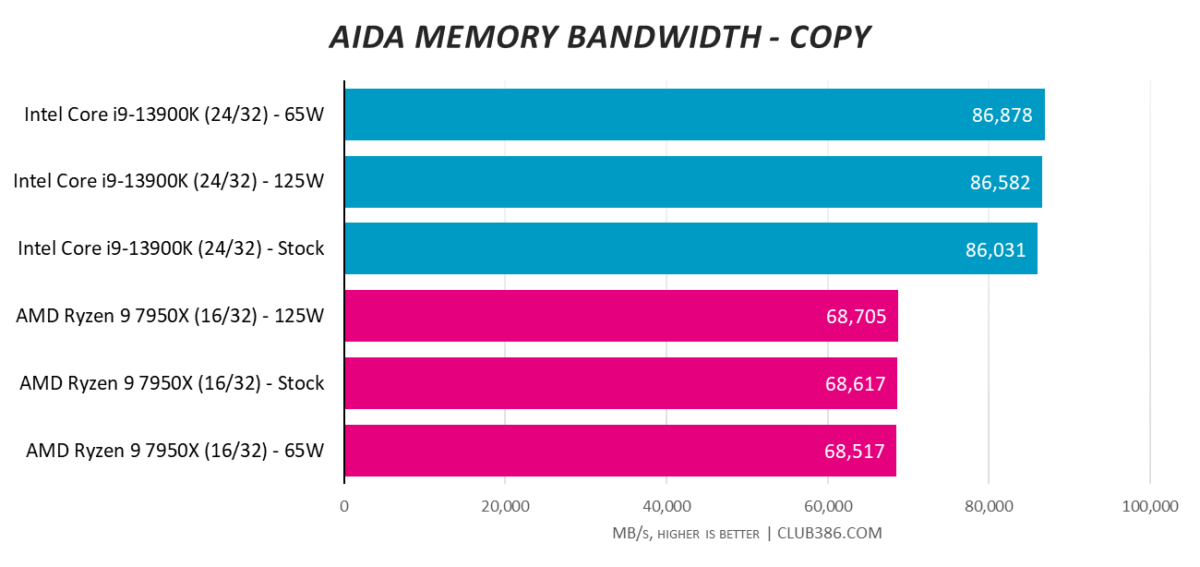
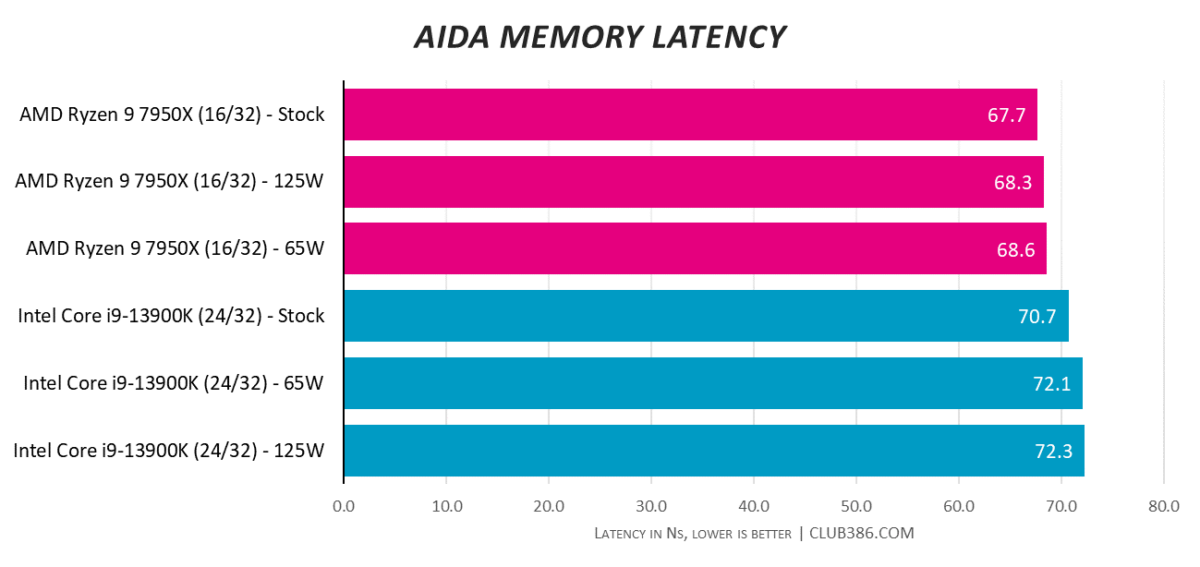
Intel offers a lot more bandwidth than Ryzen when both use the same DDR5-6000 memory, according to the popular AIDA memory benchmark.
Gaming at 1080p
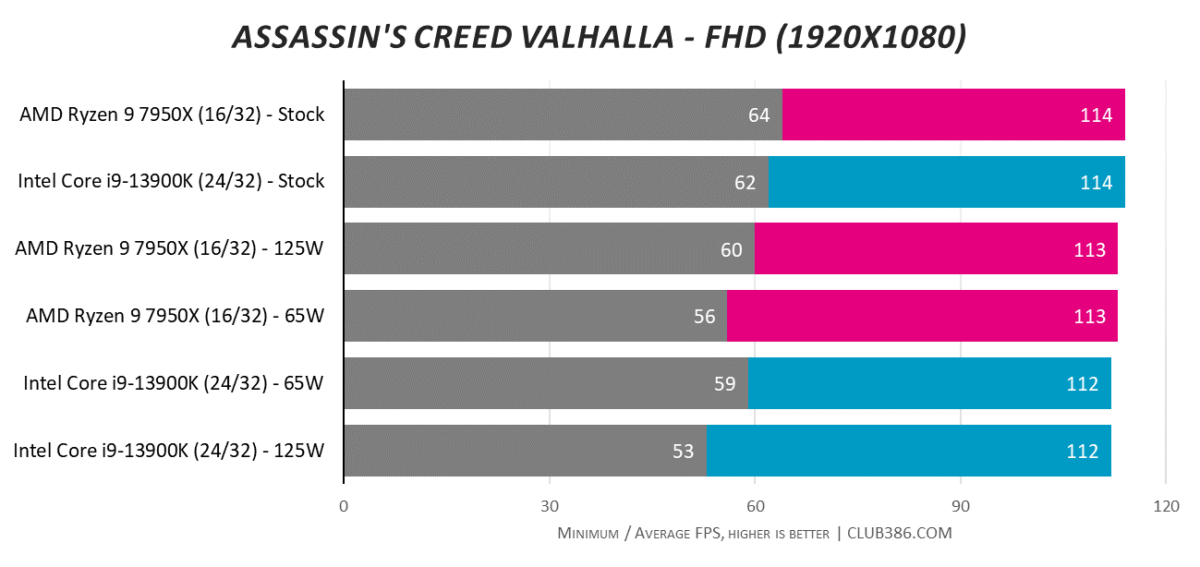
Quite the definition of a mixed bag.
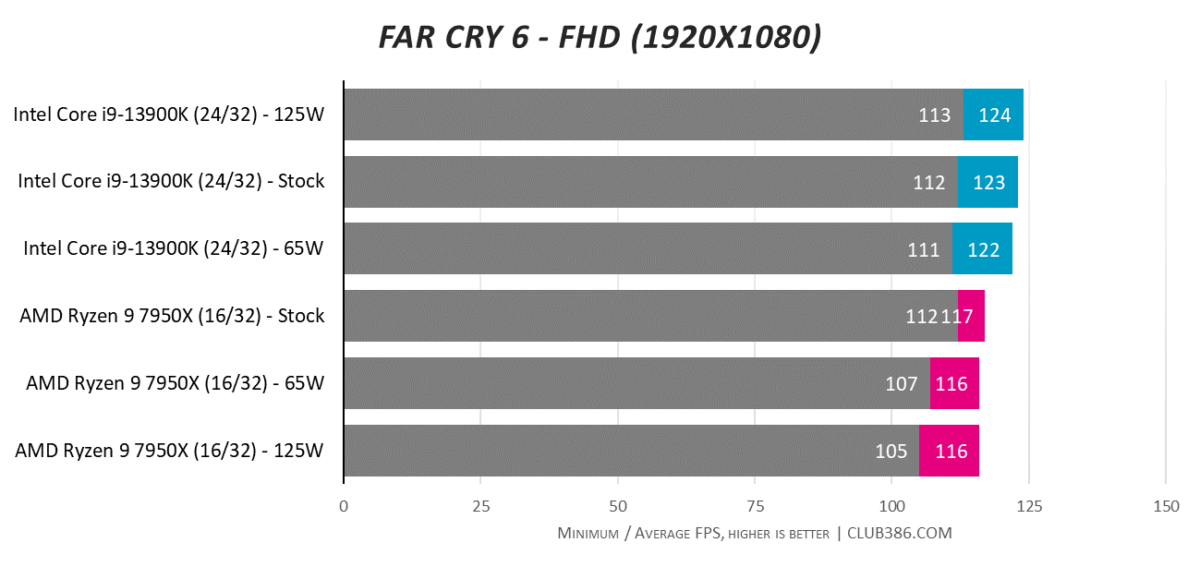
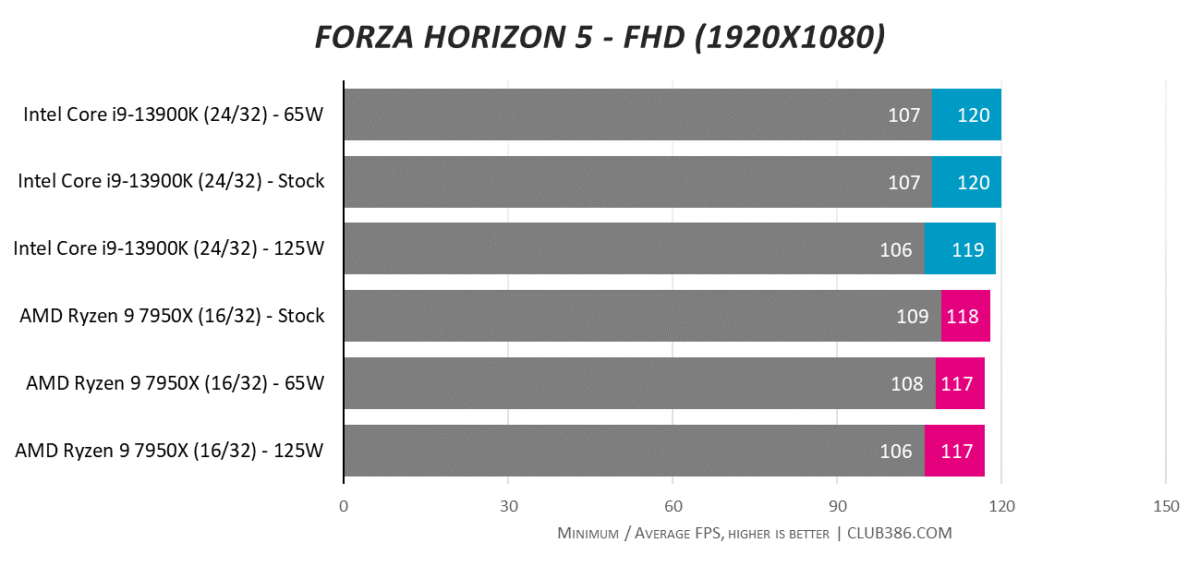
253W or 65W – doesn’t really matter in Forza Horizon 5.
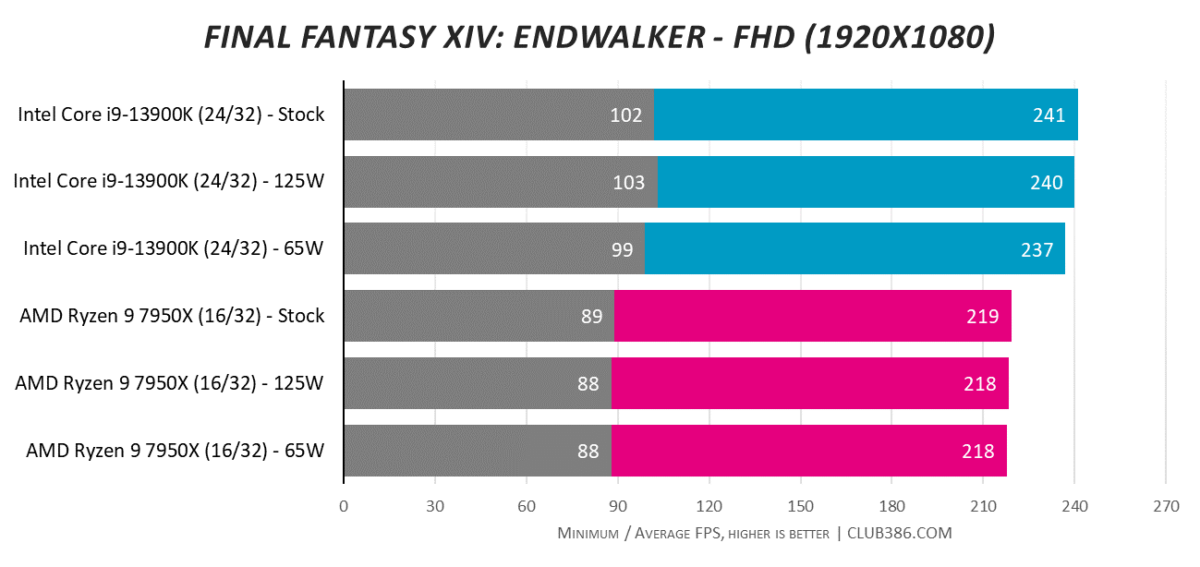
Gaming at 1440p
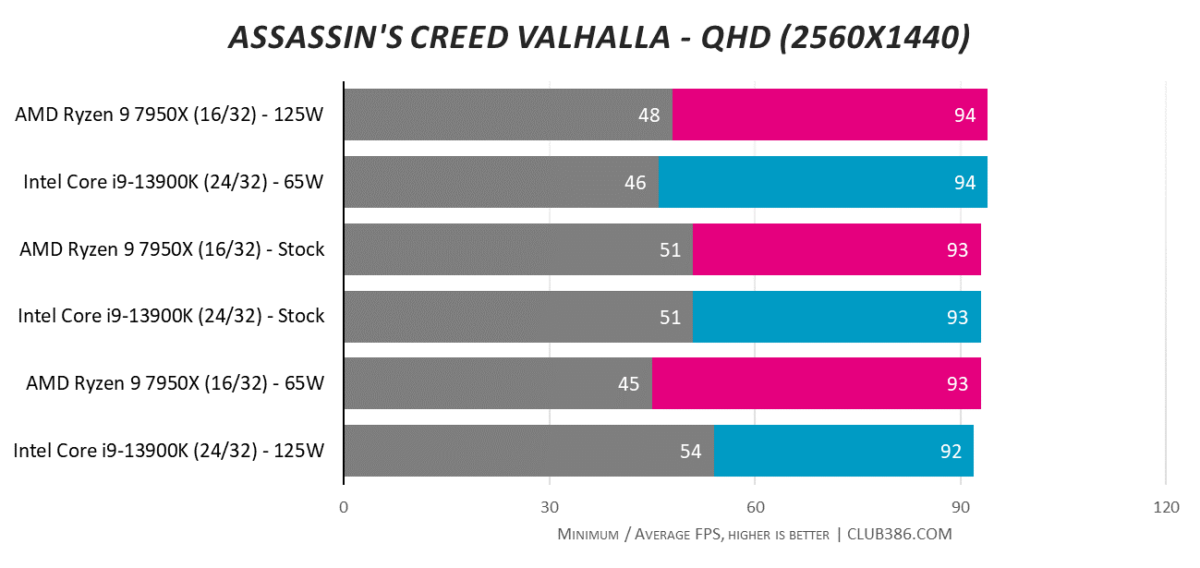
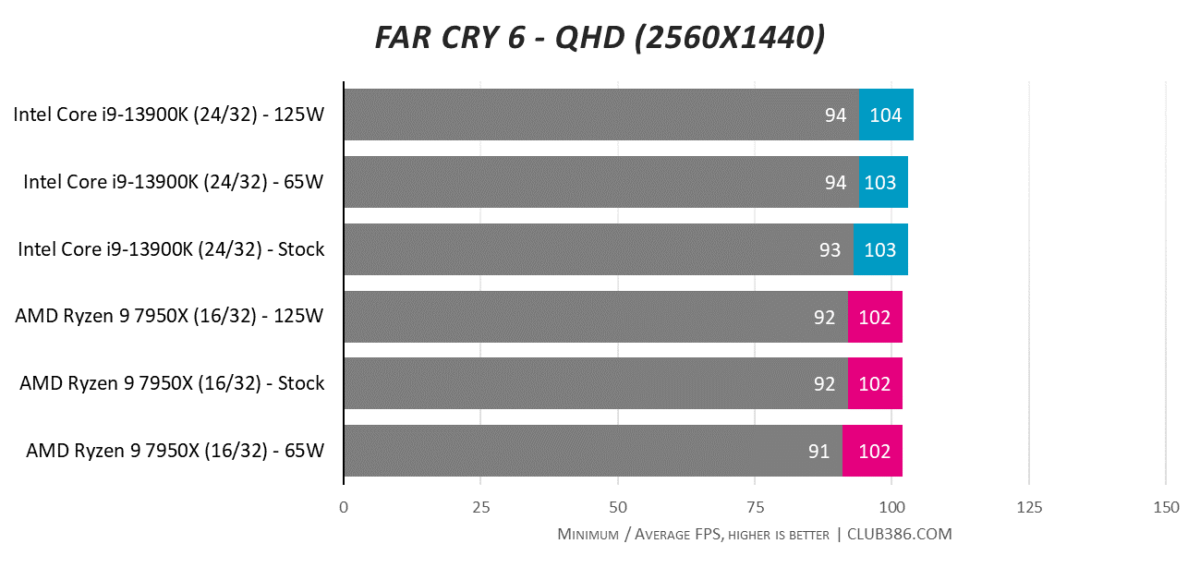
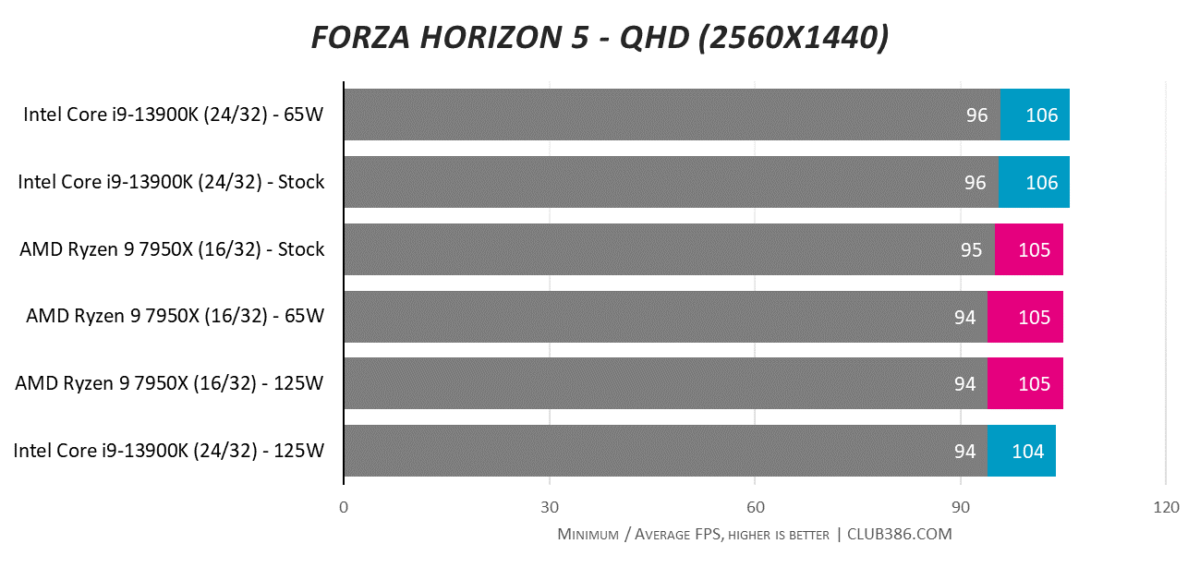
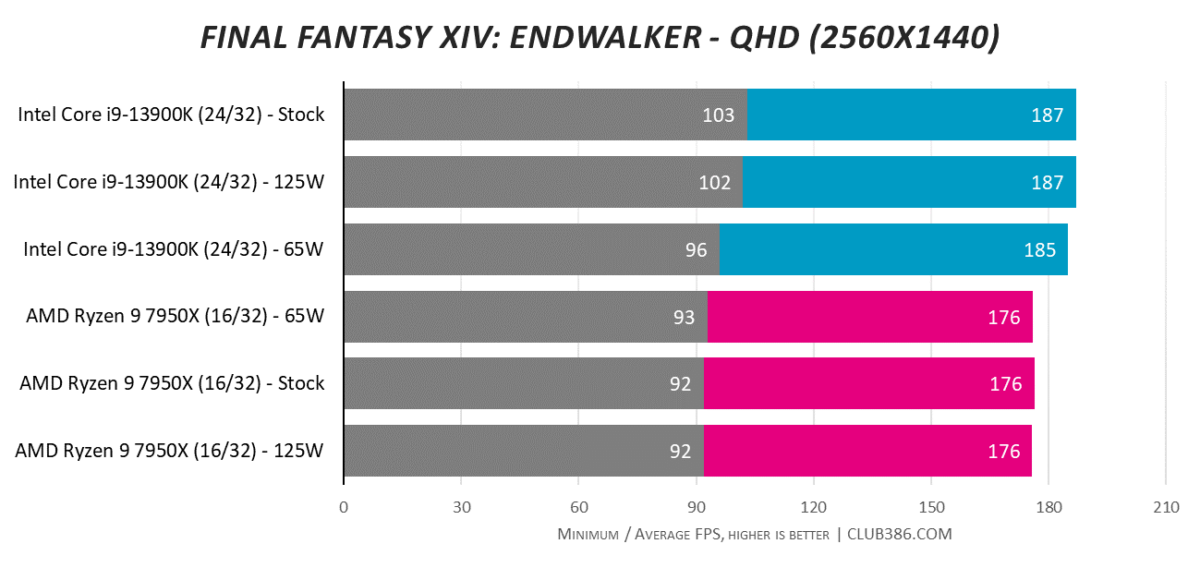
The latest Raptor Lake Core architecture is bit of a gaming beast. Power limits matter far less than which brand of processor is used.
Gaming at 2160p
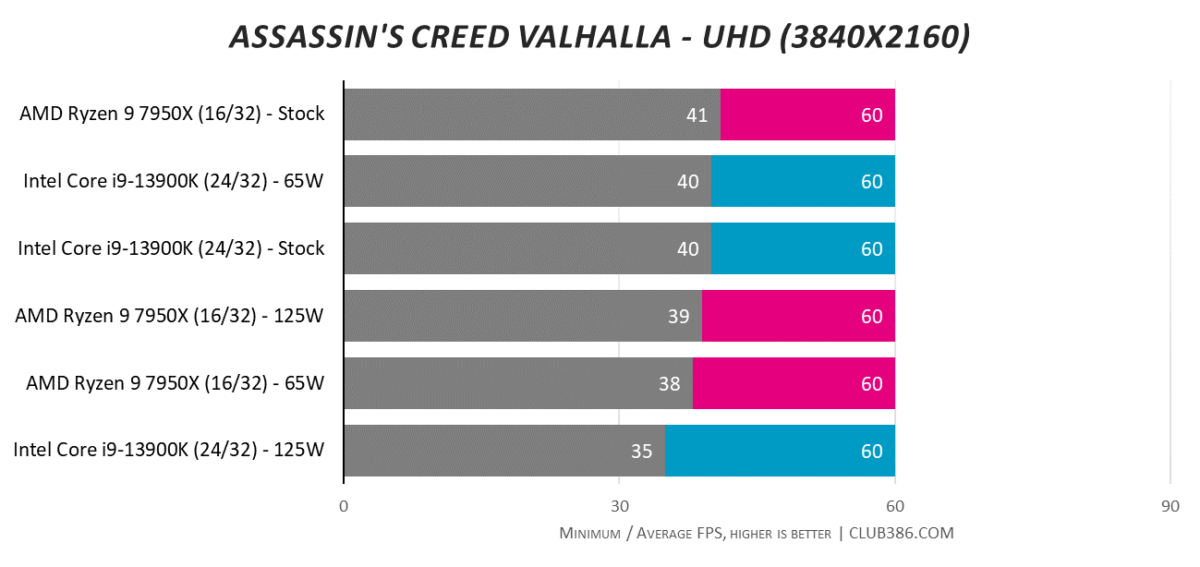
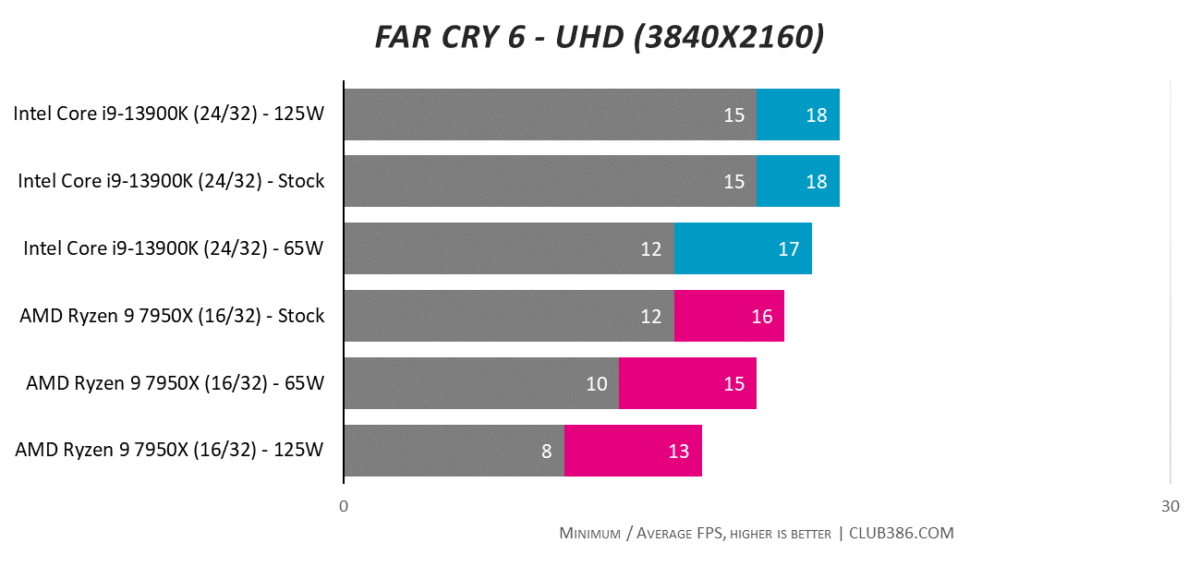
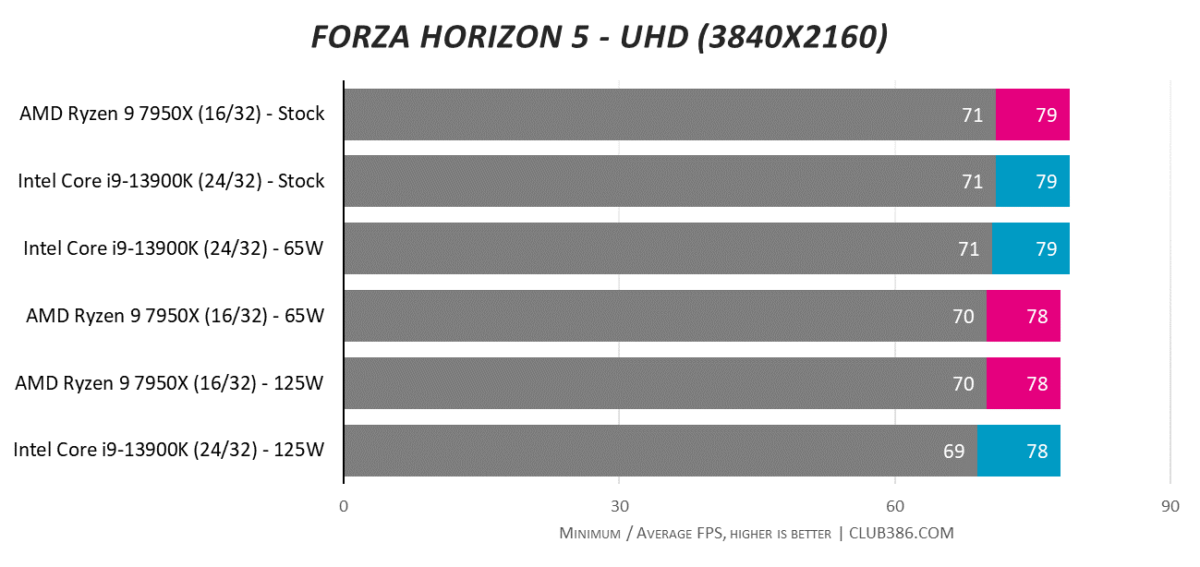
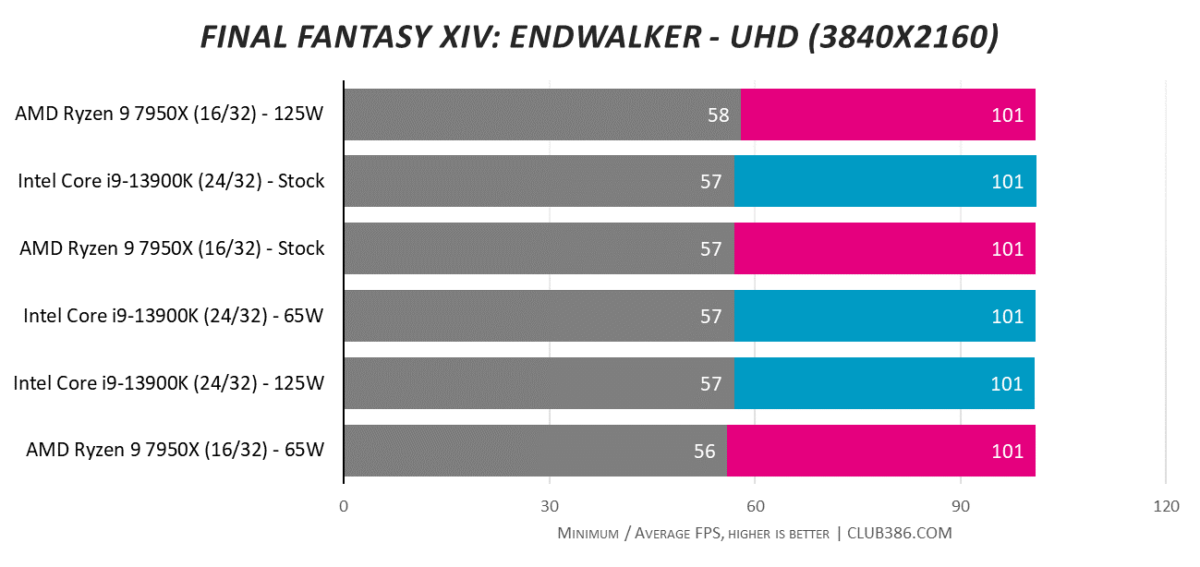
Efficiency, Temps and Running Cost
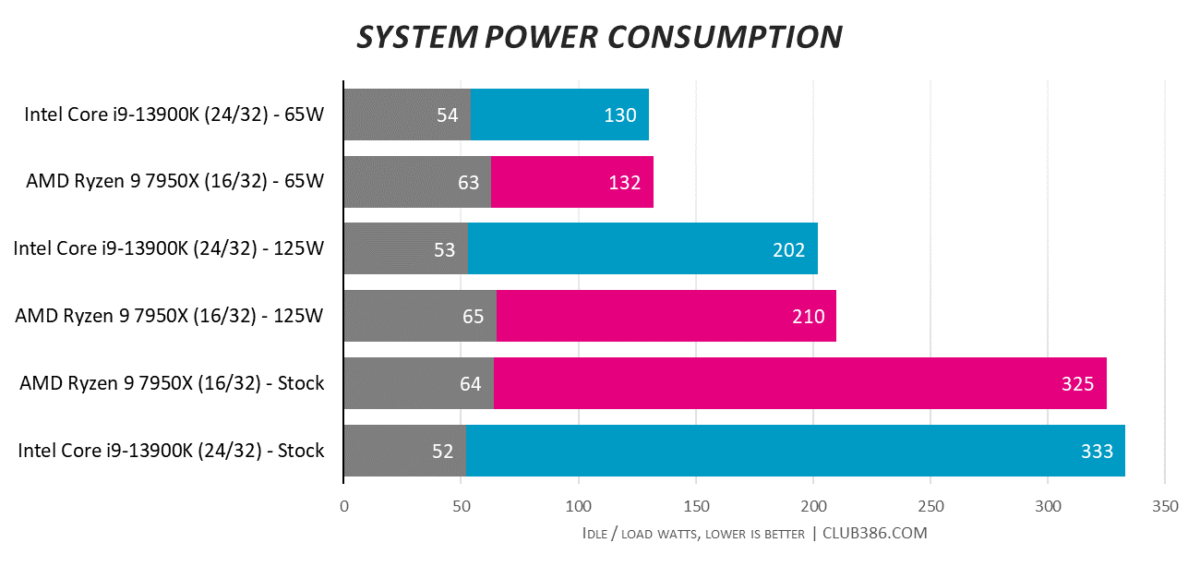
Setting strict total package power limits forces both chips into similar wattage behaviour. We’re looking at near-identical system-wide loads in all three configurations.
Doing some basic sums, we can extrapolate the following figures for Ryzen 9 7950X based on the October UK Energy Price cap rate of 34 pence per kWh.
| Running time | Annual cost @ stock | Annual cost @ 125W | Annual cost @ 65W |
|---|---|---|---|
| 1 hour per day | £40.33 | £28.43 | £18.87 |
| 6 hours per day | £241.98 | £170.58 | £113.22 |
There are of course some rather large assumptions being made here. Our figures account for the system being on for either one or six hours each day and remaining under full load for the duration. The latter may well resemble die-hard gamers, and in such an instance, dropping from stock settings to 125W would save ~£71 in annual electricity cost, again on the unlikely assumption rates won’t rise in the next 12 months. Point is, you could potentially pocket enough change for a new game or two.
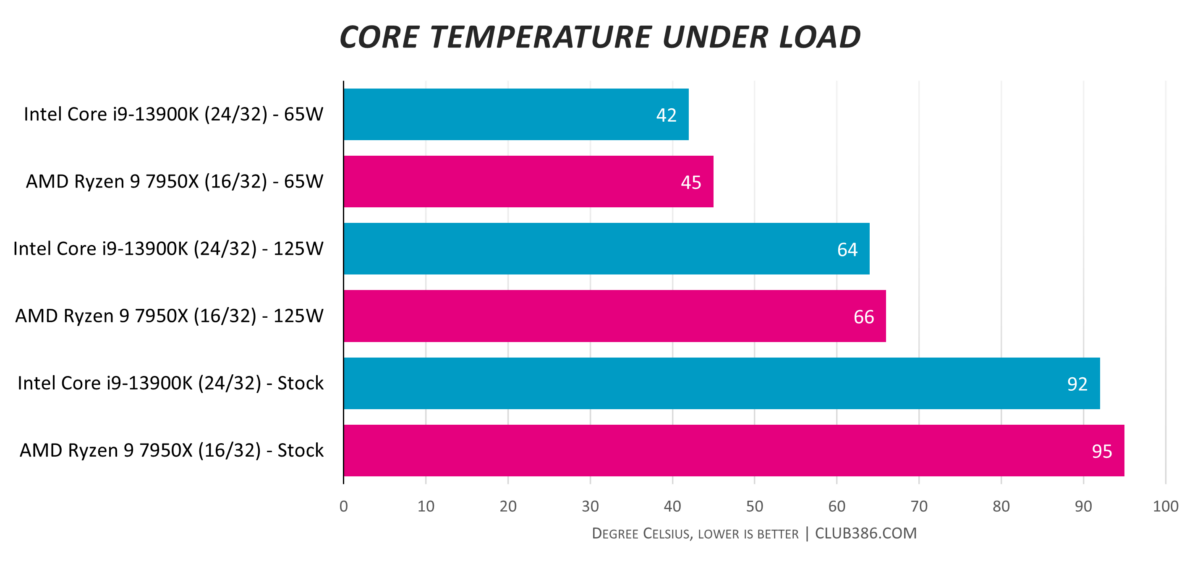
A wonderful side-effect of reducing power is much lower temperature. Both chips aren’t running a million miles above ambient when at 65W, and registering around 65°C at 125W shows high-performance systems can be cool and quiet. Makes you wonder what all the fuss is about at 230W/253W.
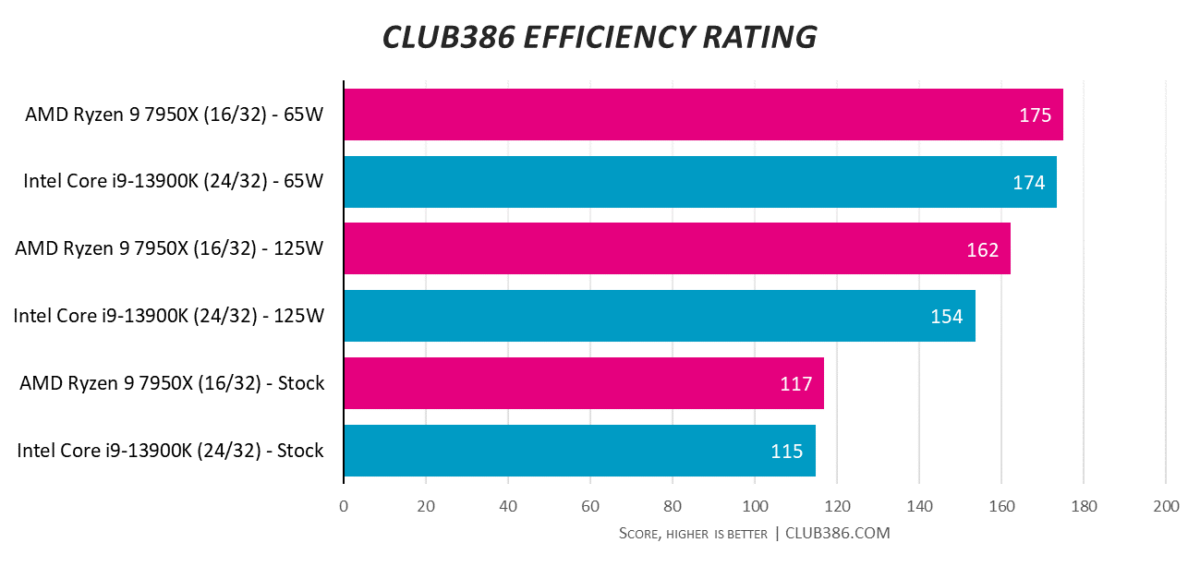
Dividing the all-core Cinebench R23 score by observed system-wide power consumption gives us these results. Ryzen 9 7950X and Core i9-13900K are at their most efficient when run at 65W, which makes a lot of sense. Even 125W produces very healthy metrics, suggesting the optimal voltage/frequency curve, as far as efficiency is concerned, lies between 65-125W.
The ongoing fight for performance supremacy has led, inexorably, to a frequency and power war, characterised by pulling out all the stops in the name of benchmark dominance. That’s not a good thing, truth be told, and we’d much rather both companies further tune processors for more restrained wattages. Cost-of-living crisis and all that.
Summary
Craving the crown of best mainstream CPU, Intel and AMD pointed serious artillery at each other last year by pitting Core i9-12900K against Ryzen 9 5950X. A close call in applications and gaming, AMD took the initiative in September 2022 and brought powerful Ryzen 7000 Series to bear. Running amok on a brand-new AM5 platform, multi-core performance is up to 40 per cent faster than its direct predecessor, making Ryzen 9 7950X a beast to be contended with. Stepping on the toes of Threadripper territory without apology, massive frequencies hikes and a modicum of IPC blur the lines between high-end desktop and workstation. A fine proposition indeed.
Facing up to rampaging Ryzen, Intel’s still-impressive Core i9-12900K doesn’t stand a chance in multi-core applications, but to the hybrid-architecture’s credit, it continues to hold steadfast in gaming. Arriving on the scene today to redress this imbalance is beefier Core i9-13900K.
Throwing the proverbial kitchen sink at AMD by harnessing more cores, higher frequencies, larger caches and faster memory, Raptor Lake’s finest does a good-enough job across the broad spectrum. Arguably better at gaming and within touching distance in a bevy of relevant multi-core applications, we’re back to the stalemate of last year, albeit on a much higher performance plane.
Those with enough cash for an exotic build this winter can rest safe in the knowledge that both processor companies have admirably upped their game with range-topping champions. Naturally working best in high-power mode, reducing wattage to 125W or 65W remains an attractive option for both camps. What little performance is lost at 125W is suitably compensated for by lower temperatures, less noise, and a lower bill. Out of the two, AMD Ryzen 9 7950X loses less innate performance, which is a testament to implementing a leading-edge manufacturing process.
Shifting down to 65W still provides handsome returns; AMD shades it in multi-core performance whilst Intel remains the leader in gaming, so you pays your money and takes your choice. Our advice is not to be afraid of reducing wattage on these impressive class-leading processors. Sacrificing a little performance goes a long way in other important areas.
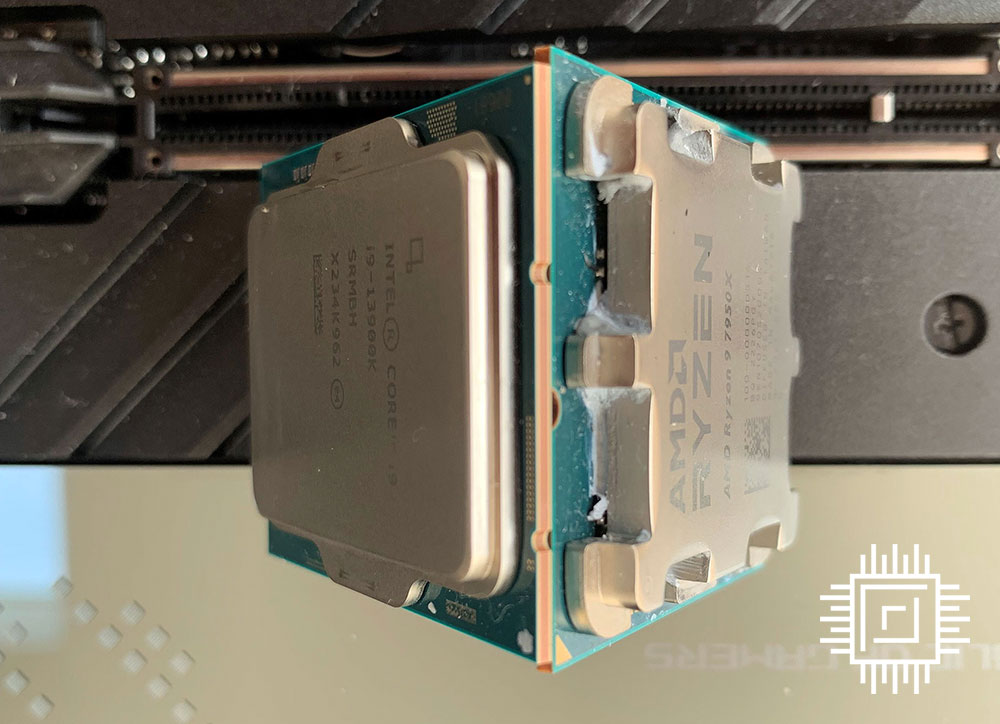
AMD Ryzen 9 7950X
“AMD Ryzen 9 7950X is a 16-core powerhouse processor and 32 threads that can do it all for the most demanding gamers and creators.”
We earn a commission if you make a purchase, at no additional cost to you.


